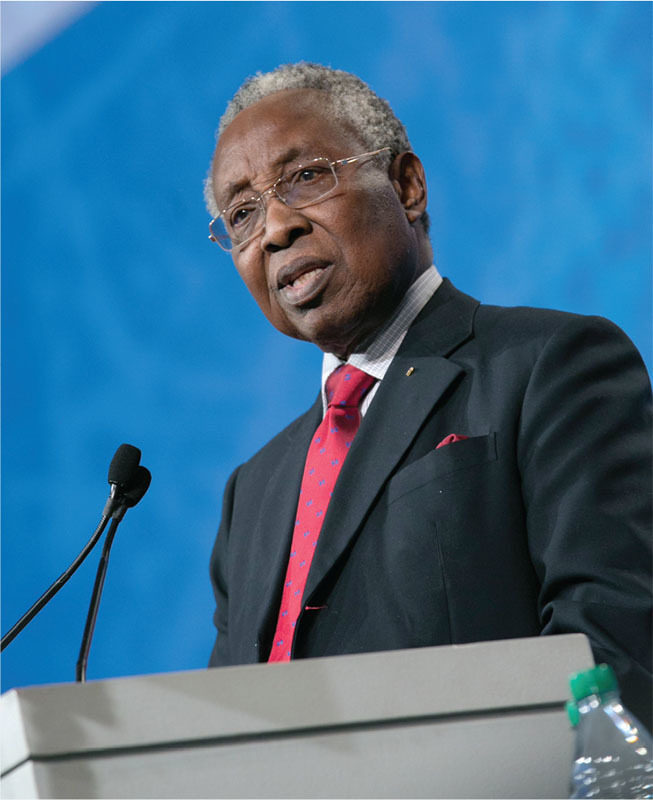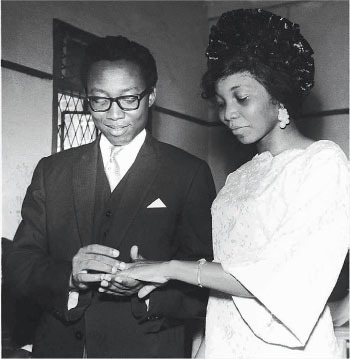Remembering Rotary International’s First and Only African President

IN MEMORIUM: A deep well of wisdom
Remembering Jonathan Majiyagbe, Rotary International’s 2003-04 president
A fledgling lawyer, Jonathan Majiyagbe joined the Rotary Club of Kano in northern Nigeria in 1967. As a man of faith, he considered his Rotary membership a natural in his life. “I knew there was the need to care for the less privileged people,” he said — and he knew that Rotary would help him accomplish that goal.
Majiyagbe climbed through Rotary’s ranks, rising from club president to RI director (1988-90) and trustee of The Rotary Foundation (1993-96). In 2003, he made history as RI’s first — and, at this date — only president from Africa. Under his presidential theme, Lend a Hand, he singled out alleviating poverty as the top priority of his term. “As Rotarians, we must open our eyes to see those around us who cannot afford shelter, health care, food, and other essentials,” he wrote to Rotary members worldwide. “We must address these problems with compassion and pragmatism.”
For decades, Majiyagbe tirelessly championed Rotary’s global polio eradication efforts. His advocacy and leadership undoubtedly contributed to the 2020 certification of the World Health Organization’s African region as free of the wild poliovirus.
Majiyagbe died 27 May in Abuja, Nigeria. He was 88.
News of Majiyagbe’s passing came during the Rotary International Convention in Melbourne. Jennifer Jones, 2022-23 RI president, paused the opening ceremony to mourn the loss of Majiyagbe. “Thank you for the communities you’ve helped, the lives you’ve impacted, and for building a legacy of compassion,” she later wrote on social media.
Many other Rotarians took to social media to remember their past leader. “Truly one of the finest persons I have come across in 50 years of my Rotary membership,” Ashok Mahajan, a past RI director and Rotary Foundation trustee, wrote on Twitter. “Certainly Rotary has lost a very fine Rotarian, and by his loss Rotary has become poorer and heaven has become richer.”
Jonathan Babatunde Majiyagbe was born in 1934 in Lagos, now Nigeria’s largest city. His father, Jacob Mofolorunsho Majiyagbe, was a civil servant, and his mother, Victoria Olatilewa Majiyagbe, was a princess from the Ogunbona royal family. While he was growing up, the family moved frequently due to his father’s job. Majiyagbe said that traveling around Nigeria enabled him to understand some of the major regional languages, providing him with a strong understanding of what comprised an all-round Nigerian. He became what he called “detribalized.”
In 1957, Majiyagbe went to study in the United Kingdom. After receiving his law degree from the University of London, he returned to his native country in 1965 and eventually set up his practice in Kano, specializing in commercial law. In those days, Majiyagbe later recalled, British and Pakistani lawyers largely dominated the legal field in northern Nigeria, a legacy of the British colonial rule, which ended in 1960. The government’s indigenization policy in the 1970s made it possible for him and other lawyers of Nigerian origin to flourish. Over the decades, his law firm, J.B. Majiyagbe & Co., represented many international companies such as KLM, British Airways, and Nigeria Airways in courts. His clients also included large banks and prominent business people in Nigeria.
A member of the Bar of England and Wales, Majiyagbe was a senior advocate of Nigeria, a title conferred on those who have distinguished themselves in the practice of law. He was a past vice president of the Nigerian Bar Association and a member of the International Bar Association. In addition, he served as chancellor of the Anglican Diocese of Kano, chair of the Kano branch of the Nigerian Red Cross Society, and a member of the Kano Chamber of Commerce, Industry, Mines and Agriculture. In 2008, he was awarded the Order of the Federal Republic of Nigeria.
Majiyagbe’s Rotary life in Kano began simultaneously with his legal career. He later shifted to the Rotary Club of Abuja Metro. “Rotary provides a vehicle for fulfilling that natural instinct in people of goodwill everywhere to care and to volunteer time for the needs of their neighbors,” he said in an essay about why he chose to be a Rotarian. He also cited the fellowship that abounds at club meetings and generates true friendship. “The friendship has a way of spreading to the local community,” he said.
“As the years have gone by, I find that my conclusions are being reinforced in my club, in the district, and in our Rotary world,” he noted.
In 1980, he became the governor of District 910, which covered clubs in 14 countries of West Africa, an area now divided into eight districts. Despite his busy law practice, he visited the clubs in each country, offering guidance and inspiration.
“He kept service and charity close to heart,” said Past RI President Mark Maloney, who served as aide to the president for Majiyagbe. Maloney recalled that, to represent his Lend a Hand logo, Majiyagbe “wanted the two hands featured in the design to be on the same level so that the person receiving is equal in standing with the person giving the aid.”
Maloney noted the great strength Majiyagbe exhibited after his first wife, Ade, died suddenly in June 2003 just as he was about to begin his presidency. Maloney and his wife, Gay, who had served as Ade’s aide, stayed with Majiyagbe during that time. “He persevered and gave life to the term ‘the family of Rotary,’” Maloney said. “He was keen for Rotarians to provide friendship and support to the families of Rotarians who had suffered a loss or illness.”
In addition to his different RI leadership roles, Majiyagbe served on several committees, including the International PolioPlus Committee, the Nigeria PolioPlus Committee, and the Reach Out to Africa Committee. “I observed Jonathan’s remarkable skills and talents,” added Maloney. “He celebrated the eradication of polio on the African continent, a goal to which he faithfully worked well beyond his time as president.”
Majiyagbe was a Major Donor and Benefactor of The Rotary Foundation with his spouse, Ayo. He received The Rotary Foundation Citation for Meritorious Service and its Distinguished Service Award. He is survived by Ayo, his son, Folorunsho, and three grandchildren.
Tunji Funsho, a past chair of the Nigeria PolioPlus Committee, called Majiyagbe a mentor and role model, lauding his patience, humility, kindness, and forgiving spirit. “He was an epitome of integrity and imbued with extraordinary intellect,” Funsho said. “I will miss the warmth of his presence and drinking from his deep well of wisdom.”
Examples of that uniquely Rotary wisdom abounded. Each month in his presidential message in this magazine, Majiyagbe included a photo of himself wearing a different costume or hat. It demonstrated that, though he wore different garments, he was the same person. “That’s what we need,” he said. “Politics should not divide us, nor should religion drive us apart.”
When a reporter asked what values he had learned about Rotary, Majiyagbe replied: “Our strength is to bring in all kinds of people; there is no barrier. And diversity is one thing I have come to admire. One past Rotary president had as his theme, Mankind Is One. As RI president, I also emphasized that.”





